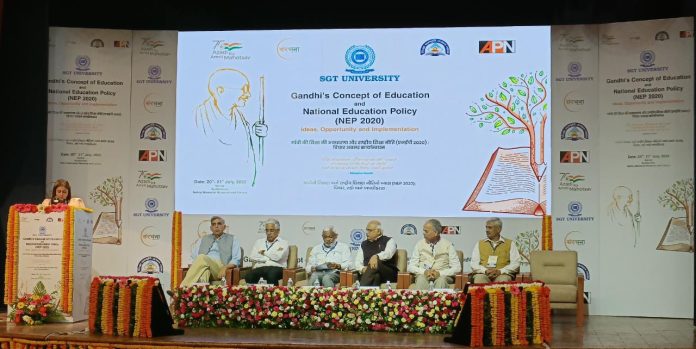The New Education Policy (NEP) has not only provided more freedom to the students but also democratized institutions, said former Delhi University Vice Chancellor Dinesh Singh on Wednesday.
He was speaking at the two-day international conference on Gandhi’s concept of education and the National Education Policy (2020) organised by SGT University at Teen Murti Bhawan, New Delhi.
On the first day of the conference, professors from various universities talked about the importance of Gandhi’s concept of education and explained how the National Education Policy would help India move forward.
The NEP is an integral part of India’s culture and the purpose of getting education is not only to get a job but to make it practical in life, Professor Dinesh Singh said.
In his address, Prof. Singh said education policy should be in the interest of the nation. The meaning of education is not to complicate the children but to make it easy for them, he said.
In NEP, the emphasis will be on changing the teachers’ training programme. In this regard, there has been a demand to recommend changes in training so that there should be good teachers from primary to a higher level, he said.
Representatives from Delhi University, CCS University, Shiksha Sanskriti Uthan Nyas, IGNOU and others were present at the conference.
Speaking on NEP 2020, Dr Sachidanand Joshi, the member secretary, Indira Gandhi National Centre for Arts, said India needs dedicated teachers. The implementation of NEP is dependent on teachers of secondary, senior secondary and primary level teachers, he said.
Joshi said the current education system is package oriented and the current education policy has decolonized Indian society.
Apart from Singh and Joshi, Dr. Anand Prakash from DU, Prof. Pawan Sharma from CCS University and Dr. Atul Kothari from Shiksha Sanskriti Uthan Nyas also expressed their views on the NEP.
The conference was organised by SGT University in collaboration with Sanrachna Foundation and Shiksha Sanskriti Uthan Nyas. Day 2 of the event will see Vice Chancellors from various universities discuss other facets of the NEP.


